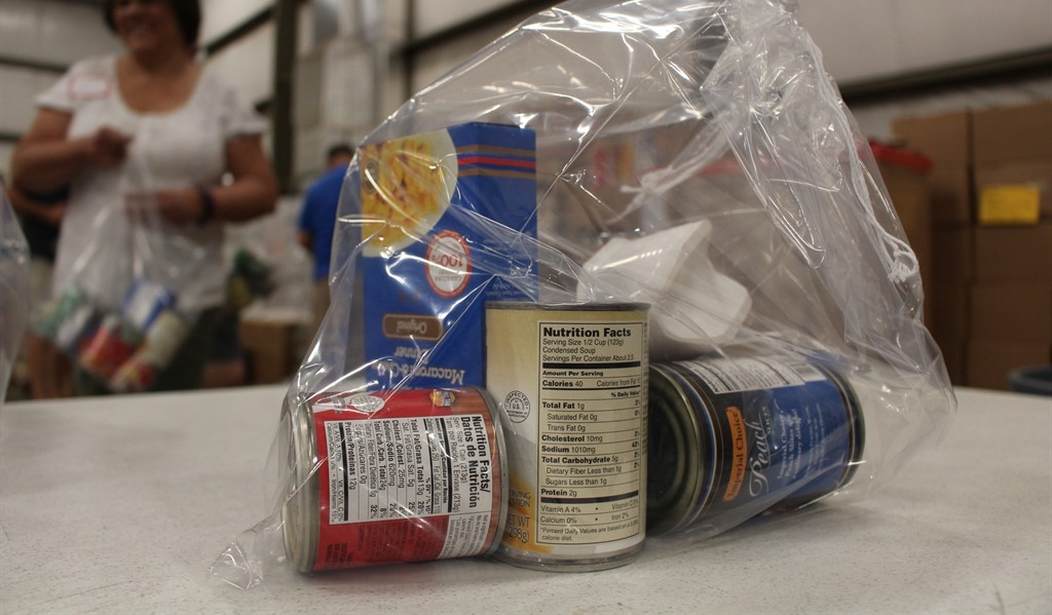It's one thing to see inflation reports, month after month, marking inflation at 40-year highs as Americans' real wages continue to decrease, but it's another to see the real-world impacts of Biden's "Build Back Better" policies on families trying to make ends meet.
In the last week, food banks across the country have warned that their inventories are being wiped out and their shelves are getting bare due to, what else, inflation.
In Albuquerque, the "Roadrunner Food Bank is feeling the pains of inflation, just like the rest of us right now–except they’re tasked with feeding thousands of New Mexicans in need," reported the local NBC affiliate. "Prices are growing out of control along with the number of people who need food assistance."
Roadrunner officials told KOB 4 they’re struggling to keep up, but they think the community may be able to help out.https://t.co/ghDELEWnOb
— KOB 4 (@KOB4) September 21, 2022
The cost for bulk goods provided by Roadrunner such as peanut butter and soup have, according to its staff, increased between 120 percent and 200 percent per case. "Officials say they have to get creative with their donated dollars and stretch what they do have as far as it will go, especially since inflation is driving more people to seek food assistance," the local NBC report added, and "demand far outweighs the supply."
Usually starting their distributions at 8:00 a.m., staff explained that they frequently have to turn people away by 8:15 because "we've met our max for the day."
A similar crisis is playing out in Cincinnati at the Freestore Foodbank. Its 100,000 square foot warehouse is typically filled to capacity with roughly five million pounds of food to distribute to those in need. According to the food bank's CEO, his warehouse is only half full due to "inflation and the struggle to find and secure enough food."
Recommended
Freestore Foodbank sees continued drop in food resources, concerned for holiday season https://t.co/TEwVAufNtN
— WLWT (@WLWT) September 20, 2022
Things aren't any better in Phoenix, which has one of the highest inflation rates in the country. The local CBS affiliate noted that "food banks are also feeling the pinch" while "the need is pretty historic here in our community."
For Harvest Compassion Center, a one-stop shop for Phoenix families in need of food, toiletries, and clothing, they've seen how demand has increased as lasting inflation spiked and became anything but transitory. "Unfortunately, the need keeps going up," said the center's executive director of a 12 percent increase in families coming in for assistance. After 13 years serving the Phoenix community, its staff said this July and August have been their busiest ever.
At the Greater Pittsburgh Community Food Bank, staff have seen "a seven-fold increase in emergency food assistance at its Duquesne location," a trend the food bank believes is "a snapshot of its 11-county service area," according to the local CBS affiliate. "Across the area, demand is up 18 percent from last year for food" that the food bank attributes to "several factors...including inflation." And things might get even more dire in their community: "Once people have to start paying their heating bills, the expectation is there will be an increase in food assistance."
INFLATION: Across the area, demand is up 18 percent from last year for food. https://t.co/b0VwPCE8cf
— KDKA (@KDKA) September 16, 2022
In Texas, the CEO of the San Antonio Food Bank is also seeing the impact of inflation on demand for assistance with basic goods as "families leave the grocery store with less food in the grocery cart than they did last year," reported the local CBS station. The resource said it used to help out around 60,000 each week before COVID-19, spiked to around 120,000 per week at the peak of the pandemic, then receded to 90,000.
But as inflation took hold and stayed at 40-year highs, there's been an "uptick" in demand for the San Antonio Food Bank's assistance, bringing "over 100,000 people a week again." And that's with a local unemployment rate of just four percent — again debunking Biden's claims that his "Build Back Better" economy is more "equitable" and in the midst of the greatest economic comeback in our country's history.
Inflation forces more people to use the food bank https://t.co/Wfmg1f28gM via @KENS5
— San Antonio Food Bank (@safoodbank) September 21, 2022
Clearly things are not going well for Americans and their families, but don't expect to see President Biden express any remorse for his policies that sent inflation soaring, nor any apologies for his attempts to assuage concerns that the price increases were "transitory." He'll keep blaming supposedly "greedy" corporations and even Vladimir Putin's war against Ukraine rather than taking responsibility despite his frequent claim that "the buck" stops with him.
Instead, he celebrates his devastating policies and is busy preparing to host an Elton John concert at the White House on Friday.
























Join the conversation as a VIP Member